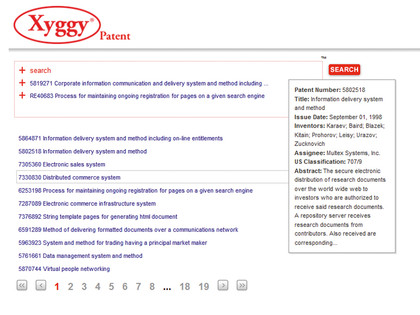
The days of typing a couple of simple words into a text box to find websites are over. The future of search will see us being presented with what we want, without us realising we're performing a search.
Imagine search engines that are able to understand voice commands and act on them intelligently; that can understand how we talk in real life; that can identify objects from a photograph we've taken or from a barcode that we're pointing our phone at; that can use where we are in the world to find relevant results; that can find the right point in a TV programme from us saying a quote from it; and that can use our social profile on Facebook to show us what we like, who we like and what we might want to share.
All this may sound like pie in the sky, but these technologies exist and the companies behind them are fighting to be the next big thing in search. Here are 20 sites that offer the future now, even if no individual one ends up taking the Google throne just yet…
1. Vlingo - Voice-based search
www.vlingo.com
Why type when you can just say what you want to find? Vlingo is a phone app that lets you say "Coffee shops in Soho" to your phone, and opens up a Google map with all of them marked on it.
There have already been five million downloads, so there's no question that there's a demand for this kind of app. It may be easy to dismiss it as a gimmick, but if you believe the company's claim that using voice commands to complete your tasks gets them completed two and a half times faster, it could be a real time-saver over the next few years.
2. Siri - Voice-based personal assistant
www.siri.com
Get daily insight, inspiration and deals in your inbox
Sign up for breaking news, reviews, opinion, top tech deals, and more.

Siri, the mobile personal assistant, works in similar ways – voice activated, and using location mapping and a mash-up of various websites to complete tasks for you, such as booking a taxi or buying tickets to see a film.
Just launch the app, say something like "Book a romantic French restaurant in Soho for 7.30" and Siri converts your words into text, asks you to confirm it's got it right, then gets to work. Siri consults restaurant review sites to find an appropriate romantic restaurant at your location, and then goes to a site such as OpenTable to check for reservations and to book your table. It then displays the result and you click a button to confirm.
Siri was recently acquired by Apple, so we see big things in its future.
3. TinEye - Reverse image search
www.tineye.com
Moving from voice to images, the website and phone app TinEye, from Idée Inc, lets you find upload an image and find where it's used on the web. It searches using the image itself, and according to its creators, it's the "first image search engine on the web to use image identification technology rather than keywords, metadata or watermarks".
When you submit your reference image, TinEye creates a unique fingerprint based on its composition, and then searches the 1.5 billion images in its database for others with the same or a partial fingerprint match. This means it only returns images that are the same as the original, rather than of a similar subject matter.
It can also find instances of the image that are digitally altered, making it ideal for finding copyright infringers.
4. Pikadeo - Find products with your phone camera
www.pikadeo.com
Pikadeo is an image-recognition tool that lets you use your cameraphone to identify a product, such as a CD or DVD. Pikadeo says it can deal with poor-quality shots and even deformations of the image – if you were taking a picture of a plastic bag, for example – and can recognise products from posters, packaging, magazine pages and labels.
Pikadeo uses image-matching software to find the product and provide a mash-up page of places to buy it, its Wikipedia entry, mentions of it on review sites and links to sites such as IMDB.
It has over 200,000 entries over five categories, so you should be able to find information on at least the most common products you photograph.
5. Mobile Concierge - Tracking where you shop
www.bit.ly/mobileconcierge
A different type of product search comes from Mobile Concierge, developed by Cisco Systems and IBM. It uses precise geolocation to provide you with information and offers on the products around you while you shop.
Once you sign up to the shop's app it can track your position down to the metre, providing you with information and deals specific to the aisle you're on or the product you're passing.
These 'micro-location'-based services change according to your loyalty to the shop and your previous shopping habits there. You can also search the store's products, and be led there by a virtual map.
6. ScanLife - Search by barcode
www.us.scanlife.com
ScanLife turns your cameraphone into a barcode scanner, letting you search for prices and information at the click of a button.
There's no need to search by keywords or type in a long web address as the barcode will take you directly to the correct product and let you know if you're about to be ripped off, thanks to its price comparison. Before making an investment, you can also check what other people think about the product through the reviews.
7. 123people - Real-time people search
www.123people.co.uk
Ever wondered how easy it is to find details about you or someone else on the web? 123people is a real eye-opener.
Just type in someone's name and it provides a real-time mash-up of where that name is mentioned on various websites. That includes YouTube, Twitter and IM accounts, pictures and videos tagged with that name, listings on phone sites such as 192.com that show how long the person has been at their current address, their age bracket and who they live with. It even pulls out Amazon wish lists!
It's an impressive demonstration of just how much information is available about you online.
8. Klout - Social media authority search
www.klout.com
Klout has made it its mission "to accurately measure and provide context around who a person influences and the specific topics they are most influential on". It provides a measure of your authority in the social sphere – specifically, Twitter.
This may sound prosaic, but this could be an important factor in how real-time searches offered by sites such as Bing or Google will be displayed in the future. Google already ranks by authority for its main web results (it decides this by monitoring the number of people linking to your site), so wouldn't it make sense to order posts based on your perceived authority in the subject?
9. Xyggy - Item-based search
www.xyggy.com

Forget text or image-based searching – how about searching with anything at all? Xyggy is based on how humans learn new concepts and generalise.
As founder Dinesh Vadhia says, "Do we use keywords when we search for that childhood photo? Yet text-search is the dominant mode in our digital lives. Imagine a world of search where everything is an item that can be dragged in and out of the Xyggy search box to find similar items in ranked order."
Xyggy uses a framework called Bayesian Sets, which can recognise relationships between different objects. This means that you can hone your search by adding different items to the Xyggy search box. If you're a fan of patents, you can try out Xyggy Patent – you enter one idea and immediately see anything similar in ranked order.
10. Haika - Semantic search
www.hakia.com
Haika is a search engine built from scratch using semantic principles to ensure results as close as possible to what the user typed in.
It calls the technology behind the search engine QDEXing, which focuses on natural language processing methods to deliver 'meaningful' search results. It pulls in results from the general web, news sites, blogs, Hakia Galleries, something it calls 'credible sources' (typically Wikipedia), video and images.
- 1
- 2
Current page: 20 search engines that do something different
Next Page Recipe search, visual search, and more